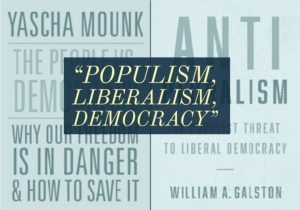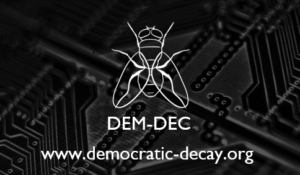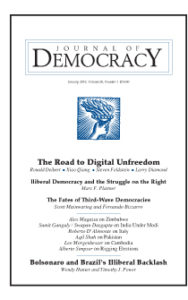
Freedom House
The latest Freedom in the World report – compiled by more than 100 experts and drawing on data from 209 countries – describes an “ominous” global erosion of democratic values and practices for the 13th consecutive year.
“That means every year for the past 13 years, there have been more countries experiencing declines in civil rights and civil liberties than those that have improved,” Freedom House president Michael Abramowitz told a Democracy in Retreat panel discussion at Johns Hopkins-SAIS.
 The panel also featured political scientist Yascha Mounk, senior fellow at Johns Hopkins’s Stavros Niarchos Foundation Agora Institute, Karen DeYoung, senior national security correspondent for The Washington Post, and Foreign Affairs journalist Elise Labott, who served as moderator. Mounk stressed the importance of benchmarking democratic norms and other indicators of freedom.
The panel also featured political scientist Yascha Mounk, senior fellow at Johns Hopkins’s Stavros Niarchos Foundation Agora Institute, Karen DeYoung, senior national security correspondent for The Washington Post, and Foreign Affairs journalist Elise Labott, who served as moderator. Mounk stressed the importance of benchmarking democratic norms and other indicators of freedom.
Democracy is not in crisis, instead, we have changed how we see and define it, argues Clay Fuller, a Jeane Kirkpatrick Fellow at the American Enterprise Institute. In short, democracy is the game of rule, while autocracy is the game of survival, he tells the Center for International Private Enterprise.
“Democracy is always going to struggle in relatively poor countries [and] in countries that don’t have a deep democratic tradition,” he said. “I think what has been highlighted for the past 13 years in the Freedom House reports is a deeper challenge: whether or not democracy is stable even in the countries which are very affluent and which do have deep democratic traditions.”
 A new special issue of the ANNALS of the American Academy of Political and Social Science (January 2019) is devoted to polarization as a key threat to democracy, notes the Democratic Decay Resource (DEM-DEC). The issue, edited by Jennifer McCoy and Murat Somer, covers polarization in a range of states, including:
A new special issue of the ANNALS of the American Academy of Political and Social Science (January 2019) is devoted to polarization as a key threat to democracy, notes the Democratic Decay Resource (DEM-DEC). The issue, edited by Jennifer McCoy and Murat Somer, covers polarization in a range of states, including:
- long-established democracies (e.g. USA);
- younger democracies formerly considered to be consolidated (e.g. Poland, Hungary);
- unconsolidated democracies facing reversal or stalling of a long democratization process (e.g. South Africa, Philippines) or nascent process (e.g. Bangladesh), and finally, ..
- states that we might consider to be at the ‘hard’ authoritarianism end of the spectrum (e.g. Venezuela, Thailand, Zimbabwe).
The editors’ conclusions to this thought-provoking collection are highly insightful, DEM-DEC adds:
 We find that the emergence of pernicious polarization (when a society is split into mutually distrustful “Us vs. Them” camps) is not attributable to any specific underlying social or political cleavage nor any particular institutional make-up. Instead, pernicious polarization arises when political entrepreneurs pursue their political objectives by using polarizing strategies, such as mobilizing voters with divisive, demonizing discourse and exploiting existing grievances, and opposing political elites then reciprocate with similarly polarizing tactics or fail to develop effective nonpolarizing responses.
We find that the emergence of pernicious polarization (when a society is split into mutually distrustful “Us vs. Them” camps) is not attributable to any specific underlying social or political cleavage nor any particular institutional make-up. Instead, pernicious polarization arises when political entrepreneurs pursue their political objectives by using polarizing strategies, such as mobilizing voters with divisive, demonizing discourse and exploiting existing grievances, and opposing political elites then reciprocate with similarly polarizing tactics or fail to develop effective nonpolarizing responses.
DEM-DEC also cites the latest issue of the Journal of Democracy, published for the National Endowment for Democracy by the Johns Hopkins University Press through Project MUSE.
Created by Dr Tom Gerald Daly (Melbourne Law School), the Democratic Decay Resource (DEM-DEC) is aims to provide useful information on the deterioration of democratic rule worldwide through a mixture of curated, collaborative, and user-generated content, including a Bibliography, Concept Index, Experts Database, Events Database, Teaching Materials, and Links.







